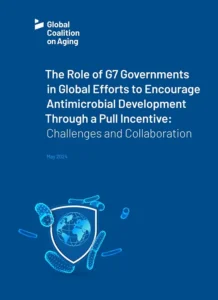In September, countries will gather for the 2024 UNGA High-Level Meeting on AMR, where they have the opportunity to put the findings of this report into place.
 New York, NEW YORK (May 8, 2024) – The Global Coalition on Aging (GCOA), in partnership with the Japanese Pharmaceutical Manufacturer’s Association (JPMA), and public health leaders call on G7 governments to fund pull incentives and make “fair share” investments in antibiotic innovation to fight the global antimicrobial resistance (AMR) crisis. GCOA, JPMA, and health and government officials from the European Union, Italy, Japan, and United Kingdom recently convened to discuss how G7 countries must respond. GCOA today published a report detailing takeaways from the closed-door meeting, “The Role of G7 Governments in Global Efforts to Encourage Antimicrobial Development Through a Pull Incentive: Challenges and Collaboration.”
New York, NEW YORK (May 8, 2024) – The Global Coalition on Aging (GCOA), in partnership with the Japanese Pharmaceutical Manufacturer’s Association (JPMA), and public health leaders call on G7 governments to fund pull incentives and make “fair share” investments in antibiotic innovation to fight the global antimicrobial resistance (AMR) crisis. GCOA, JPMA, and health and government officials from the European Union, Italy, Japan, and United Kingdom recently convened to discuss how G7 countries must respond. GCOA today published a report detailing takeaways from the closed-door meeting, “The Role of G7 Governments in Global Efforts to Encourage Antimicrobial Development Through a Pull Incentive: Challenges and Collaboration.”
Antimicrobials, including antibiotics, form the foundation of modern healthcare systems. They helped add an estimated average of 23 years to lifespans across the world during the latter part of the 20th century. An average one-fifth of G7 populations are currently over the age of 65, and as these societies age, they become more vulnerable to an infection without cure. At the same time, the effectiveness of existing antimicrobials is waning, with few new medicines in pipeline ready to replace them; the last time an entirely new class of antimicrobials was discovered was in the 1980s.
“Antimicrobials are unlike any other product in today’s medicine chest because we must limit their use to preserve their efficacy, but this imperative removes any incentive to invest in this space. At the same time, antibiotics are the basic infrastructure of modern healthcare. Without them, even routine procedures like hip replacements, root canals, and common infections can become life threatening,” said Michael Hodin, CEO of the Global Coalition on Aging. “Governments have a critical role to play to incentivize their development as a public good. At the 2022 G7 Health Ministers’ meeting in Germany, leaders pledged to work toward implementing pull incentives in their countries. Two years later, there has not been enough action. We urgently need pull incentives, delinked from sales volumes of antimicrobials, at a scale that can propel innovation.”
GCOA convened the private workshop of experts and officials from Japan, Canada, the United Kingdom, Italy, the European Union, and the United States to discuss the need for action on the implementation of pull incentives – a policy option that could address our critical need for new antimicrobials – across both the G7 and European Union, as well as globally.
They found that:
- The lack of new antimicrobials and increasing resistance against existing antimicrobials has a severe impact on those most at-risk of infection.Older antibiotics are growing less effective due to increasing AMR, and new development is nearly at a halt, meaning that for millions, options are running out.
- The current state of the antimicrobial pipeline is inadequate against growing AMR and must be prioritized.Currently, there are few antimicrobial candidates that meet the World Health Organization (WHO) innovation criteria targeting priority pathogens.
- Incentive structures to develop new antimicrobials must be supported, with consideration to globally equitable access to products once they reach the market. The UK is currently the only country with a fully functional pull incentive. Other countries must rise to the challenge and complement the UK system with their own incentives.
- Global collaboration and attention to countries’ “fair share,” based on GDP, is an imperative to tackle AMR. The G7 and EU together can shoulder the burden to make a solution possible, and the more countries involved means that the collective whole will be greater than the sum of its parts.
The cost of inaction on antimicrobial innovation is far higher than the cost of action. The current healthcare burden of AMR is estimated at about $1 trillion USD, globally. If all G7 members contributed their “fair share” to a $4.5 billion USD pull incentive to fund a single new antibiotic, the return on investment would be unparalleled at 5:1.
At the 2024 UNGA High-Level meeting on AMR in September, all countries will have the unique opportunity to convene and take meaningful action to combat AMR. The G7 countries, as well as those in the EU, must demonstrate leadership and reaffirm their commitment to research and innovation that can address the AMR crisis.
The roundtable included two members of the Japanese Diet, leaders from several Japanese Ministries and the Ministry of Health of Italy, top AMR officials from the European Commission and the World Health Organization, patient advocates, and public health leaders from Canada, the UK, and the US, among others.
To read the report in English, click here. To read the report in Japanese, click here.
About the Global Coalition on Aging
The Global Coalition on Aging aims to reshape how global leaders approach and prepare for the 21st century’s profound shift in population aging. GCOA uniquely brings together global corporations across industry sectors with common strategic interests in aging populations, a comprehensive and systemic understanding of aging, and an optimistic view of its impact. Through research, public policy analysis, advocacy, and strategic communications, GCOA is advancing innovative solutions and working to ensure global aging is a path for fiscally sustainable economic growth, social value creation and wealth enhancement.
For more information, visit: www.globalcoalitiononaging.com
 Global Coalition On
Global Coalition On